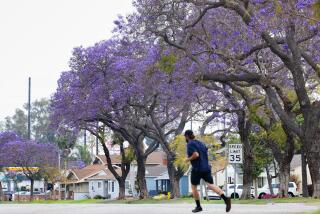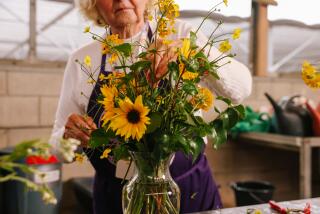Chinese New Year’s Luck Rides Aroma of Narcissus
SAN GABRIEL VALLEY — Just a whiff and the fairies will come bearing gifts--fame, fortune, court-side Lakers tickets, that sort of thing--in time for the Chinese New Year.
Superstition has it that fairies will follow their noses to the most beautiful, fragrant shui sen , or narcissus, and work their magic. A tall, elegant blossom in the first days of the New Year is sort of the ultimate fortune cookie. Luck, according to folklore, will abound.
Gardeners are already searching out Chinese stores and nurseries throughout the San Gabriel Valley for narcissus bulbs and potted flowers in preparation for the New Year, which starts Jan. 23, according to the Chinese lunar calendar. Monterey Park’s Chinese New Year Festival on Jan. 16 and 17 includes a flower market, where narcissus will be sold.
“A lot of Chinese here, they still have to live in the Chinese way,” said Richard Yuan, assistant manager at Monterey Park’s Diho Market, which sells the bulbs and planted flowers, imported from Shanghai. “Right now, the economy is not good. Maybe they hope they can have good luck” with the flower.
Die-hard traditionalists wouldn’t consider just any plain old narcissus from an American nursery, Yuan said.
“American ones, no smell,” he sniffed.
True believers coddle the flower as if it were Aladdin’s lamp. They carve the bulbs so the flowers will grow in different shapes--splayed like crab legs or in an arch-like design that symbolizes good luck.
They constantly check the temperature and water to make sure the flower has prime growing conditions. At night, they put the flowers on top of the refrigerator or in front of heaters for warmth.
“People are superstitious,” said Edward K. C. Wong, director of the Monterey Park Chamber of Commerce and head of Prajna Buddhist temple in Monterey Park.
But some people throw up their hands and decide to forgo the trouble.
“That’s the problem,” said Margaret To, president of Monterey Park’s Downtown Merchants Assn. “A lot of people buy instant ones, already bloomed.”
“The world is changing,” Wong said. “Everything is instant.”
Officials of the merchants association and the chamber, co-sponsors with the city of the New Year’s festival, want to change that. They’re hoping people will go back to the old ways and nurse the bulbs along themselves.
Wong will be selling baby shui sen at the festival’s flower market for about $20 each; the price will be based on looks. He and his wife planted 100 bulbs the other day, and he frets that they jumped the gun.
“I told her not to start so early,” he grumbled.
Wong, 56, is a bit rusty. It’s the first time he has planted the New Year’s flower since he went to high school in Hong Kong.
He shook his head with impatience.
“The weather is so unpredictable,” he moaned. “Last two days, it’s so cold. Flowers will not bloom. Two weeks ago, it was so warm.”
At the flower market, Wong said he will corner people--especially young Chinese--and explain the significance of the shui sen and the importance of caring for the flower.
He is good on the stump, earnestly explaining that a long stem means a long life. But when pressed, he concedes that the bloom of his flowers is not so much tied to the gods of good fortune as people might think.
Really, he said with a laugh, it’s “whether you have a green finger.”






